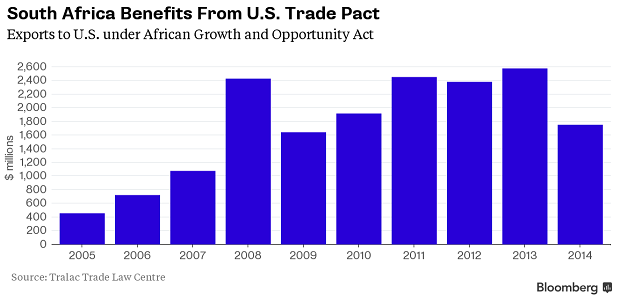News
South African farmers see pain as U.S. trade deal unravels

South African fruit, wine and nut farmers are bracing for hardship as the U.S. looks set to rescind their duty-free access to the world’s largest market at a time when they’re already facing the worst drought in more than two decades and rising input costs.
South Africa missed a Dec. 31 deadline to remove barriers on beef and chicken imports from the U.S., placing it at risk of losing trade preferences for its agricultural goods under the Africa Growth and Opportunities Act, or AGOA. South Africa exported $154 million worth of farm goods under the program in the first nine months of last year, according to the Trade Law Centre, which is based in Stellenbosch, near Cape Town.
“The U.S. is the crown jewel of our markets,” Piet Smit, a citrus farmer in the southwestern town of Citrusdal, said by telephone on Tuesday. “If we lose the AGOA benefits there will be extra costs that the farmers will have to swallow.”
Adopted in 2000, AGOA eliminates U.S. import levies on more than 7,000 products ranging from textiles to manufactured items from 39 African nations. To remain beneficiaries, countries are required to cut barriers to U.S. trade and investment, operate a market-based economy, protect workers’ rights and implement economic policies to reduce poverty.

Agricultural goods accounted for about 14 percent of total South African exports under AGOA in the first nine months of last year, according to the Trade Law Centre. The bulk of its shipments were vehicles and car parts.
Deal Possible
South Africa has made substantial progress in addressing outstanding issues and a deal may still be reached to avoid a loss of the trade preferences, Trade Minister Rob Davies told reporters in the capital, Pretoria, on Monday.
If the negotiations collapse, the hardest hit will be farmers in the Western Cape province, which exports 78 percent of the South African agricultural goods shipped to the U.S. under AGOA.
“The province’s wine and citrus industries benefit substantially from duty-free access to the U.S. market via AGOA,” Tim Harris, the chief executive officer of trade and investment promotion agency Wesgro, said by e-mail. “We are extremely concerned that these industries will be collateral damage if these benefits are not retained.”
Drought has already curbed farming in South Africa, extending a recession in the industry into the third quarter as output contracted an annualized 12.6 percent. South Africa is the world’s second-biggest exporter of oranges and the top producer of macadamia nuts.
Wine, Citrus
South Africa sold 10.7 million liters (2.8 million gallons) of wine to the U.S. last year, or 2.5 percent of its total wine exports, according to Wines of South Africa, an industry body. The wine industry employs 289,000 people nationally, and job losses are likely if the trade preferences are lost, said Andre Morganthal, the group’s spokesman.
South Africa is the world’s seventh-biggest wine producer and its largest international customers include the U.K., Germany and the Netherlands.
“The U.S. is the last great hope for South African wine exporters,” Etienne Heyns, global sales executive for Graham Beck Wines, said by phone from Franschhoek, near Cape Town. “Should wine be excluded from AGOA benefits it will add about five rand ($0.32) extra to every bottle.”
South Africa’s export volumes of citrus climbed 11 percent in 2014, the Citrus Growers Association said in its 2015 annual report. About 6 percent of the country’s soft citrus and 3 percent of its oranges was shipped to the U.S. that year, the CGA said.




